 W
W2001: A Space Odyssey is a 1968 epic science fiction film produced and directed by Stanley Kubrick. The screenplay was written by Kubrick and Arthur C. Clarke, and was inspired by Clarke's 1951 short story "The Sentinel" and other short stories by Clarke. A novel released after the film's premiere was in part written concurrently with the screenplay. The film, which follows a voyage to Jupiter with the sentient computer HAL after the discovery of an alien monolith affecting human evolution, deals with themes of existentialism, human evolution, technology, artificial intelligence, and the possibility of extraterrestrial life.
 W
WAndanggaman is a 2000 historical drama film directed by Roger Gnoan M'Bala. It was an international co-production between the Ivory Coast, Burkina Faso, Switzerland, Italy and France.
 W
WBuud Yam is a 1997 Burkinabé historical drama film written and directed by Gaston Kaboré. It is the sequel to the film Wend Kuuni. As of 2001, it was the most popular African film ever in Burkina Faso.
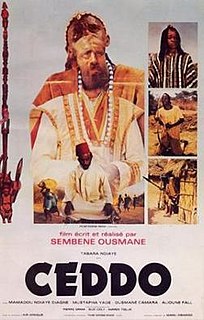 W
WCeddo, also known as The Outsiders, is a 1977 Senegalese drama film directed by Ousmane Sembène. It was entered into the 10th Moscow International Film Festival.
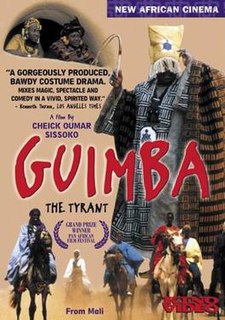 W
WGuimba the Tyrant is a 1995 Malian comedy drama film in the Bambara language, directed by noted Malian director Cheick Oumar Sissoko. The movie shows the rise and fall of a cruel and despotic village chief Guimba, and his son Jangine in a fictional village in the Sahel of Mali. Some of the storytelling is done through the village griot, and with the film being placed in an old setting, this lends an epic touch to the movie. The exact chronological setting of the movie is difficult to ascertain, since it is set in an isolated village, but the commonly used weaponry shown is the blunderbuss. However, one scene outside the village features a neem tree, a species introduced to Africa in the colonial period. The film has some magical components, including a solar eclipse brought on by magic. Casting was only partially done from among professional actors.
 W
WIyore is a 2014 Nigerian drama film set in the Benin Kingdom, directed by Frank Rajah Arase. It stars Rita Dominic, Joseph Benjamin, Okawa Shaznay, Paul Obazele, Bukky Wright and Yemi Blaq. Before its release, it has been nominated in ten categories at the 2014 Golden Icons Academy Movie Awards, slated to be held on 25 October 2014.
 W
WKirikou and the Sorceress is a 1998 traditional animation feature film written and directed by Michel Ocelot. Drawn from elements of West African folk tales, it depicts how a newborn boy, Kirikou, saves his village from the evil witch Karaba. The film was originally released on 9 December 1998. It is a co-production between companies in France, Belgium and Luxembourg and animated at Rija Films' studio in Latvia and Studio Exist in Hungary.
 W
WMountains of the Moon is a 1990 biographical film depicting the 1857–1858 journey of Richard Francis Burton and John Hanning Speke in their expedition to Central Africa which culminated in Speke's discovery of the source of the Nile River and led to a bitter rivalry between the two men. The film stars Patrick Bergin as Burton and Iain Glen as Speke. Delroy Lindo appears as an African whom the explorers meet.
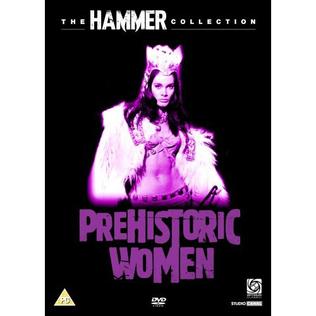 W
WPrehistoric Women is a 1967 British fantasy adventure film in DeLuxe Color and CinemaScope. The film stars Martine Beswick as the main antagonist and stage actor Michael Latimer. Steven Berkoff features in a small role at the end.
 W
WRoots is an American television miniseries based on Alex Haley's 1976 novel Roots: The Saga of an American Family. The series first aired on ABC in January 1977. Roots received 37 Primetime Emmy Award nominations and won nine. It also won a Golden Globe and a Peabody Award. It received unprecedented Nielsen ratings for the finale, which still holds a record as the third-highest-rated episode for any type of television series, and the second-most watched overall series finale in U.S. television history. It was produced on a budget of $6.6 million.
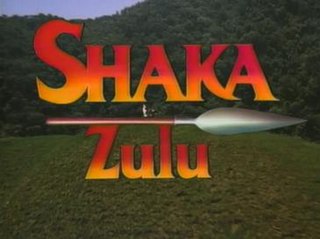 W
WShaka Zulu is a 1986 South African television series directed by William C. Faure and written by Joshua Sinclair for the South African Broadcasting Corporation (SABC), based on Sinclair's novel of the same name (1985). It is based on the story of the king of the Zulu, Shaka, and the writings of the British traders with whom he interacted. Harmony Gold USA partly funded and distributed Shaka Zulu in spite of the economic sanctions at the time. It aired in the United States in syndication. The series consists of 10 episodes of approximately 50 minutes each in duration.
 W
WTilaï is a 1990 award-winning Burkinabé drama film co-written, co-produced, and directed by Idrissa Ouédraogo. It premiered at the 1990 Toronto Festival of Festivals.
 W
WWend Kuuni is a 1982 Burkinabé drama film directed by Gaston Kaboré. It was followed with the sequel Buud Yam (1997).
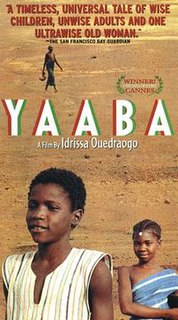 W
WYaaba is a 1989 Burkinabé drama film written, produced, and directed by Idrissa Ouedraogo, "one of the best known films from francophone sub-Saharan Africa". It won the Sakura Gold prize at the 1989 Tokyo Film Festival. The film was selected as the Burkinabé entry for the Best Foreign Language Film at the 62nd Academy Awards, but was not accepted as a nominee.
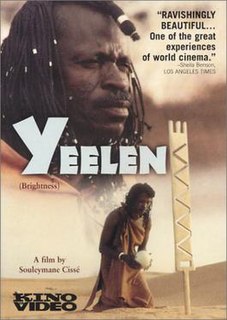 W
WYeelen is a 1987 Malian film directed by Souleymane Cissé. It is filmed in the Bambara and Fula languages, and is based on a legend told by the Bambara people. Though the era is undefined, it is presumably set in the 13th century in the Mali Empire and is a heroic quest narrative featuring magic and precognition.